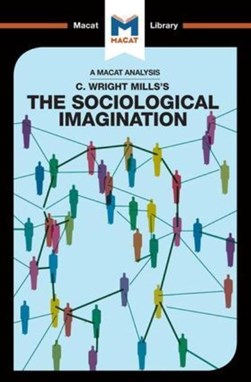-
BROWSE 1000s OF BOOKS IN STOCK
-
FREE DELIVERY ON ORDERS OVER €10
An Analysis of C. Wright Mills's The Sociological Imagination
PAPERBACK
Series: See all books in this series
C. Wright Mills's 1959 book The Sociological Imagination is widely regarded as one of the most influential works of post-war sociology. At its heart, the work is a closely reasoned argument about the nature and aims of sociology, one that sets out a manifesto and roadmap for the field. Its wide acceptance and popular reception is a clear demonstration of the rhetorical power of Wright's strong reasoning skills. In critical thinking, reasoning involves the creation of an argument that is strong, balanced, and, of course, persuasive. In Mills's case, this core argument makes a case for what he terms the "sociological imagination", a particular quality of mind capable of analyzing how individual lives fit into, and interact with, social structures. Only by adopting such an approach, Mills argues, can sociologists see the private troubles of individuals as the social issues they really are. Allied to this central argument are supporting arguments for the need for sociology to maintain its independence from corporations and governments, and for social scientists to steer away from 'high theory' and focus on the real difficulties of everyday life. Carefully organized, watertight and persuasive, The Sociological Imagination exemplifies reasoned argument at its best.
€9.43

28 Reward Points
In stock online
Extended Range: Delivery in 2-3 working days
Any purchases for more than €10 are eligible for free delivery anywhere in the UK or Ireland!
C. Wright Mills's 1959 book The Sociological Imagination is widely regarded as one of the most influential works of post-war sociology. At its heart, the work is a closely reasoned argument about the nature and aims of sociology, one that sets out a manifesto and roadmap for the field. Its wide acceptance and popular reception is a clear demonstration of the rhetorical power of Wright's strong reasoning skills. In critical thinking, reasoning involves the creation of an argument that is strong, balanced, and, of course, persuasive. In Mills's case, this core argument makes a case for what he terms the "sociological imagination", a particular quality of mind capable of analyzing how individual lives fit into, and interact with, social structures. Only by adopting such an approach, Mills argues, can sociologists see the private troubles of individuals as the social issues they really are. Allied to this central argument are supporting arguments for the need for sociology to maintain its independence from corporations and governments, and for social scientists to steer away from 'high theory' and focus on the real difficulties of everyday life. Carefully organized, watertight and persuasive, The Sociological Imagination exemplifies reasoned argument at its best.

28 Reward Points
Any purchases for more than €10 are eligible for free delivery anywhere in the UK or Ireland!
€9.43

28 Reward Points
Any purchases for more than €10 are eligible for free delivery anywhere in the UK or Ireland!
Series: See all books in this series
Product Description
C. Wright Mills's 1959 book The Sociological Imagination is widely regarded as one of the most influential works of post-war sociology. At its heart, the work is a closely reasoned argument about the nature and aims of sociology, one that sets out a manifesto and roadmap for the field. Its wide acceptance and popular reception is a clear demonstration of the rhetorical power of Wright's strong reasoning skills. In critical thinking, reasoning involves the creation of an argument that is strong, balanced, and, of course, persuasive. In Mills's case, this core argument makes a case for what he terms the "sociological imagination", a particular quality of mind capable of analyzing how individual lives fit into, and interact with, social structures. Only by adopting such an approach, Mills argues, can sociologists see the private troubles of individuals as the social issues they really are. Allied to this central argument are supporting arguments for the need for sociology to maintain its independence from corporations and governments, and for social scientists to steer away from 'high theory' and focus on the real difficulties of everyday life. Carefully organized, watertight and persuasive, The Sociological Imagination exemplifies reasoned argument at its best.
Product Details
ISBN9781912127092
FormatPAPERBACK
PublisherROUTLEDGE (15 July. 2017)
No. of Pages106
Weight200
Language English
Dimensions 198 x 138 x 6

